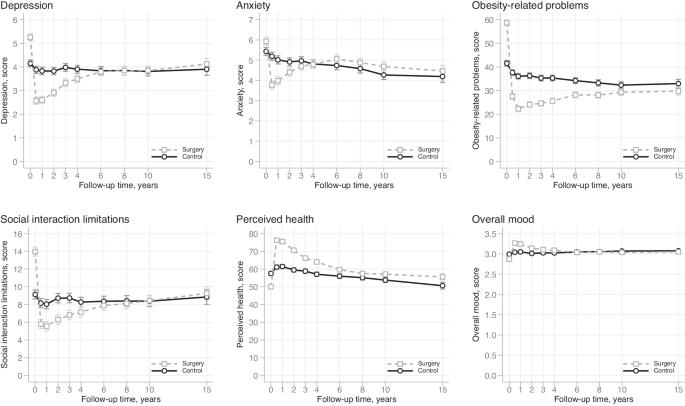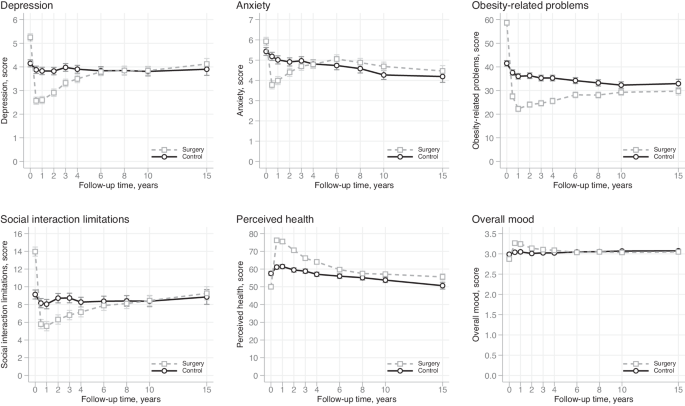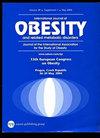减肥手术和非手术肥胖治疗后十五年健康相关生活质量的变化。
IF 4.2
2区 医学
Q1 ENDOCRINOLOGY & METABOLISM
引用次数: 0
摘要
背景:有关减肥手术后长期(≥10 年)健康相关生活质量(HRQoL)发展的证据仍然有限,且主要基于小规模研究。本研究旨在探讨:(1) 减肥手术和非手术肥胖治疗后15年精神、身体、社会和肥胖相关HRQoL的变化;(2) 社会人口学因素和术前健康状况是否与手术组15年HRQoL变化相关:参与者来自非随机、前瞻性、对照瑞典肥胖受试者研究。手术组(N = 2007,按协议)接受胃旁路术、胃束带术或垂直胃束带成形术,匹配对照组(N = 2040)接受常规肥胖护理。研究人员于 1987-2001 年招募,在治疗前和 0.5、1、2、3、4、6、8、10 和 15 年后进行了测量(包括六种 HRQoL 量表)。使用所有观测数据建立了多层次混合效应回归模型:与对照组相比,手术患者在 15 年中的健康感知和总体情绪改善幅度更大,抑郁、肥胖相关问题和社会交往限制的减少幅度也更大(均为 p 结论:手术患者在 15 年中的健康感知和总体情绪改善幅度更大,抑郁、肥胖相关问题和社会交往限制的减少幅度也更大(均为 p):与接受常规治疗的患者相比,手术患者在 15 年内的 HRQoL 有了更积极的发展。在肥胖相关问题上,这种差异很大,但在其他方面差异很小。术前患有糖尿病的患者可能面临更大的风险,其长期的 HRQoL 改善程度较小。本文章由计算机程序翻译,如有差异,请以英文原文为准。


Fifteen-year changes in health-related quality of life after bariatric surgery and non-surgical obesity treatment
Evidence on the long-term (≥10 years) development of health-related quality of life (HRQoL) following bariatric surgery is still limited and mainly based on small-scale studies. This study aimed to investigate (1) 15-year changes in mental, physical, social, and obesity-related HRQoL after bariatric surgery and non-surgical obesity treatment; and (2) whether sociodemographic factors and pre-operative health status are associated with 15-year HRQoL changes in the surgery group. Participants were from the non-randomized, prospective, controlled Swedish Obese Subjects study. The surgery group (N = 2007, per-protocol) underwent gastric bypass, banding or vertical banded gastroplasty, and matched controls (N = 2040) received usual obesity care. Recruitment took place in 1987–2001 and measurements (including six HRQoL scales) were administered before treatment and after 0.5, 1, 2, 3, 4, 6, 8, 10 and 15 years. Multilevel mixed-effect regression models using all observations for estimation were conducted. Surgical patients experienced greater 15-year improvements in perceived health and overall mood, and greater reductions in depression, obesity-related problems, and social interaction limitations than controls (all p < 0.001, adjusted for baseline differences). Effect size (ES) was classified as large only for obesity-related problems (ES = 0.82). At the 15-year follow-up, surgical patients reported better perceived health (p < 0.001) and less obesity-related problems (p = 0.020) than controls. In the surgery group, patients with baseline diabetes had smaller 15-year reductions in social interaction limitations (p < 0.001) and depression (p = 0.049) compared to those without baseline diabetes. Although surgical patients with a history of psychiatric disorder reported lower HRQoL than those without such history over the 15-year follow-up, there were no significant differences in the long-term improvements between the two groups (p = 0.211–0.902). Over 15 years, surgical patients experienced more positive development of HRQoL compared to those receiving usual care. This difference was large for obesity-related problems, but otherwise the differences were small. Patients with pre-operative diabetes might be at increased risk for smaller long-term HRQoL improvements.
求助全文
通过发布文献求助,成功后即可免费获取论文全文。
去求助
来源期刊

International Journal of Obesity
医学-内分泌学与代谢
CiteScore
10.00
自引率
2.00%
发文量
221
审稿时长
3 months
期刊介绍:
The International Journal of Obesity is a multi-disciplinary forum for research describing basic, clinical and applied studies in biochemistry, physiology, genetics and nutrition, molecular, metabolic, psychological and epidemiological aspects of obesity and related disorders.
We publish a range of content types including original research articles, technical reports, reviews, correspondence and brief communications that elaborate on significant advances in the field and cover topical issues.
 求助内容:
求助内容: 应助结果提醒方式:
应助结果提醒方式:


